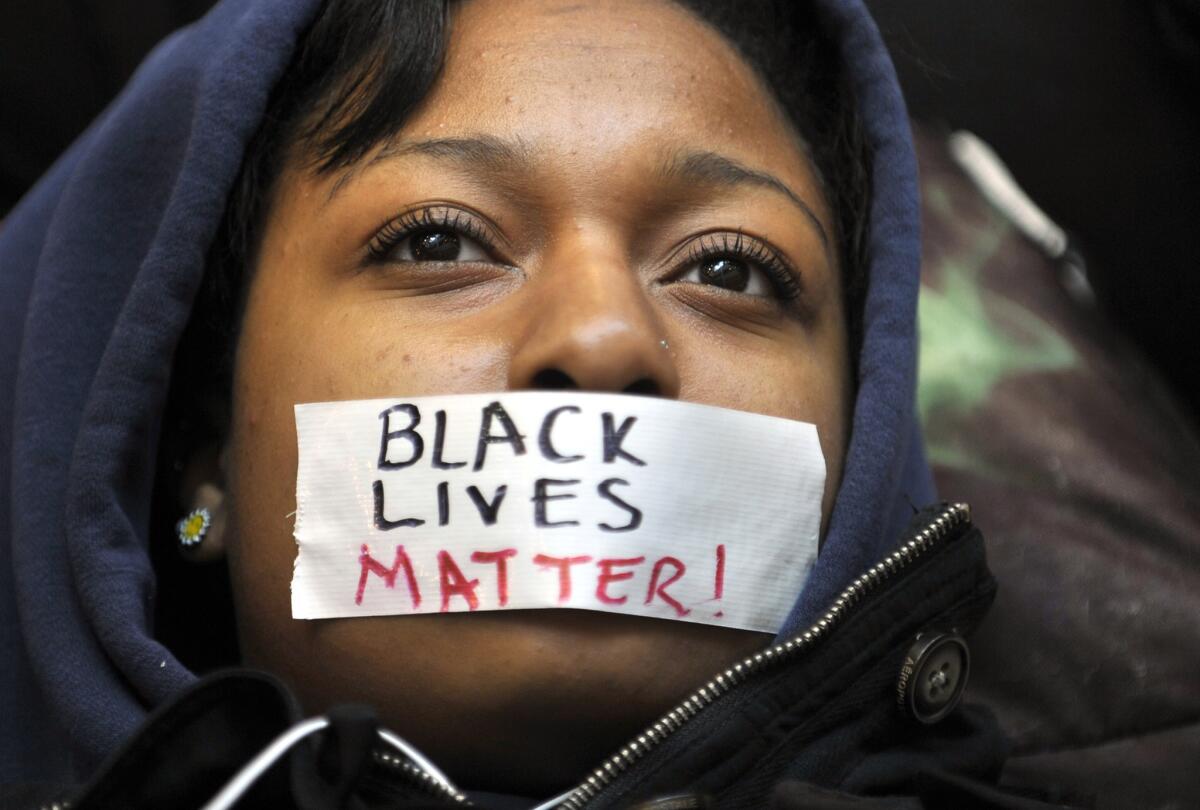Column: Cancel culture is as American as apple pie

It was Tuesday afternoon when I first stumbled across a letter published in Harper’s Magazine decrying a cancel culture that leads to job terminations, book cancellations and pariahship among intellectuals who say the wrong thing. I remember the day because I was about to meet with Los Angeles Times management, 12 of whom have the power to cancel my career, to discuss the ways in which they’ve failed Black journalists.
It’s no secret The Times has for nearly two months endured a sustained rebellion among staffers over embarrassing diversity numbers, a toxic culture that runs Black journalists out the door and allegations of deplorable pay disparities.
For the record:
5:25 a.m. July 11, 2020This column originally misstated the terms on which James Bennet left the New York Times. He resigned.
And so, when I read this vaguely worded letter — signed by 151 journalists, academics and authors — that griped at the internet’s novel ability to surface critiques of their work, citing a “stifling atmosphere” that “will ultimately harm the most vital causes of our time,” I kept thinking about all the voices that have been stifled at this institution over the last 138 years. The authors of the Harper’s letter say they want to protect the free market of ideas, an idea the 151 signers believe underpins our democracy. I kept thinking about how unfree that market really is.
I later learned the letter was conceived by five cis men including expatriate writer Thomas Chatterton Williams, who told me he is deeply concerned by institutions’ responses to internet outrage.
“People can be arbitrarily punished by social media mobs,” Williams said. “The crowdsourcing of the HR department doesn’t serve anyone well.”
It is true that institutions’ abrupt reactions to fervent digital criticism can be hasty and illogical (as when media companies de-platformed their 21st century Blackface episodes with no clear strategy in mind).
But it is also true that bosses can make terrible choices for many reasons, and have been doing so for generations. I and other Black staffers during that Tuesday meeting reminded the 12 managers of their terrible decisions for over an hour.
For centuries the bad decisions bosses make have often penalized the most marginalized. Now, the repercussions of these bad decisions are experienced in a new normal in which the silenced are silent no more. Furthermore, the lack of those marginalized voices in the upper echelons can force said companies to move hastily to rectify wrongs — the people who might have been able to address blind spots before they caused harm have for too long been denied access and decision-making power.
Now public platforms like Twitter can exponentially magnify criticism of these bad choices due to the sheer number of people who can amplify critiques with just their fingers. These marginalized people have, for the first time, had unfettered access to talk back to institutions that for far too long were the gatekeepers defining acceptable discourse.
“People are innovative and use the tools and technology they have available to levy critiques,” Sarah Jackson, an associate professor at the University of Pennsylvania’s Annenberg School for Communication, told me. “The current media ecosystem makes these critiques more visible to the mainstream than ever before, which may be why people feel surprised or threatened.”
Jackson added that social media has, if anything, expanded the idea of American democracy because it allows Black, Indigenous, trans and queer people to amplify their causes instead of having to rely on a roaming journalist to bring it to the mainstream.
The signers of the Harper’s letter seem to believe that cancel culture, stemming from the angry young internet wokes who demand to dominate the direction of the public discourse, is new. That is false.
Instead, for the first time in American history, institutions are forced to finally listen to those they’ve canceled.
For years, Black people were kidnapped from the shores of Africa and forced with violence to toil on American land, being denied a legal right to fight back. Even so, when legal slavery was abolished, the government enabled white people to systemically terrorize and lynch Black people who dared to speak their minds and vote. It was not until the 1960s that the law enabled Black people to engage in the most democratic thing of all time — voting. And still, suppression of this constitutional right persists to this day.
That is cancel culture.
But the letter did not reference this. Nor did it reference the current industrywide calls and public actions that media leadership — long elitist and lily white — be inclusive of those who look nothing like them.
Williams told me the letter intentionally left out references to recent flaps so it “can stand on its own” after this moment passes.
“This isn’t about one person,” Williams said. “This is about the entire climate.”
Still, the imprecise letter seemed to refer to the ex-New York Times editorial page editor James Bennet, who resigned after publishing an op-ed by a sitting U.S. senator who called for the military to violate Americans’ right to free speech and expression.
It was in this mindset I read the letter and stumbled upon a flurry of exchanges in a closed journalists of color Slack where a discussion surrounding it was growing. A suggestion was made by MinnPost’s Washington correspondent Gabe Schneider that we do something.
“Harper’s says it will publish responses,” Schneider wrote. “What if we all got a large number of JOCs to cosign a counter letter?”
That message spawned a crowdsourced effort to address these elites in a meaningful way. Released Friday morning, “A More Specific Letter on Justice and Open Debate” amassed over 160 signers, including University of Pennsylvania professor Jackson, Washington Post opinions editor Karen Attiah and Kerri Greenidge, a Tufts University scholar whose name initially appeared on the Harper’s letter but later was removed at her request.
The response noted a free speech violation the Harper’s letter did not.
“It seems at best obtuse and inappropriate, and at worst actively racist, to mention the ongoing protests calling for policing reform and abolition and then proceed to argue that it is the signatories who are ‘paying the price in greater risk aversion,’” the response said. “It’s particularly insulting that they’ve chosen now, a time marked by, as they describe, ‘powerful protests for racial and social justice,’ to detract from the public conversation about who gets to have a platform.”
I was involved in the early stages of organizing this response. I pushed for it to be published on the Objective, a collective “focused on how journalism has interacted with historically ignored communities in terms of hiring and retention in newsrooms,” instead of Harper’s magazine. Why? Because Harper’s is a 170-year-old institution that doesn’t pay interns.
“Why are we giving them clicks,” I asked on Slack.
I joined the effort in part because I am currently risking cancellation to speak back at my bosses and the industry at large about their repeated failure to create diverse and inclusive newsrooms — here at the L.A. Times and elsewhere.
I did not feel the need to pen a letter like the one in Harper’s, whining about the potential reactions the social media mob may have, in part because I do not have the energy or the time to performatively rehash a reality I and my ancestors have lived for 400 years. Instead, I am doing the work that needs to happen to save this newspaper from financial ruin and to create a space where people who look like me are not whimsically canceled by managers who cannot conceive an America that is not their own.
Instead, I’m working with my Black colleagues, demanding top editors and our owner stop putting out fuzzy statements and start shining a light on this newspaper’s racist underbelly and working to transform what we do, how we treat the people who work here, and how we serve the Greater Los Angeles area.
Schneider said he initiated the response because he was disturbed by the endorsement from the “most prominent writers” who penned a letter that “erased all the problems trans journalists and writers of color experience.”
“Even though the industry suggests we operate under objectivity when everyone in power is a white man,” he told me. “There aren’t black people in the newsroom. They are shut out because they haven’t been hired.”
That is cancel culture.
The imprecision of the Harper’s letter made it confusing even to some signatories.
For writer and trans activist Jennifer Finney Boylan, the words were a “well-meaning, if vague, message against internet shaming.” Boylan, who later said she regrets signing it, seemed to be unaware her name would be alongside novelist J.K. Rowling, who has freely deployed transphobic rhetoric. In the vague words of the letter, Rowling found shelter in the notion that the existence of trans people should be an “open debate.”
The fact that people are even debating the existence of trans people is the epitome of cancel culture.
The letter deploys transphobic dog whistles throughout, and they exist in a context signors willfully ignored, said Cordelia Yu, a content strategist who contributed to the response.
“The context is the language they are using, which is language that is used by transphobic people,” Yu said. “To not have noticed that, that’s unconscionable.
“Curious ignorance is learning,” Yu added. “This sort of ignorance is willful. When it’s willful, it’s an intent and a decision and that’s something I can’t take.”
Most of the people who signed the Harper’s letter still have their prominent platforms. Bari Weiss, who once tried shaming media outlets into cutting ties with a freelance journalist, is still a New York Times opinion staffer. And Rowling will always be the successful novelist behind the billion-dollar Harry Potter franchise.
These 151 signers still have access to elite institutions to espouse their beliefs, I told Williams.
“For now,” he replied.
“I don’t have any guarantee that next month I’m not gonna be on Patreon because that’s where everyone is for not getting in line with whatever the whims of the new orthodoxy are,” Williams added.
He’s right in a sense. The gatekeepers are the deciders of what is en vogue. And if you are not in step, you risk cancellation.
But the accepted belief that objectivity sits in the white gaze is still prized in this industry. Any deviation from it is deemed activism and those who talk back are often exiled.
That is cancel culture.
So while it may be true people lose opportunities for getting caught being transphobic, sexist and racist, that is the exception. Not the rule. I know far too many Black journalists who on a daily basis tell me the ways in which their managers chastise them for challenging the so-called objective white gaze and demanding their outlet be less racist.
That is cancel culture.
I’ve frequently and publicly chastised the L.A. Times for the abysmal funding received by the fellowship I am a part of. I’ve called out senior editors over Slack for their blind spots on our recent looting coverage, and our masthead and executive editor for their failure to attract and retain Black reporters, editors and photographers.
I am literally putting the trajectory of my career at risk. Why? Because I’ve decided I’m not working in an industry that keeps canceling its Black journalists who hold it to a higher standard. Tweeting generalities about our racist industry is bold. It may move the needle. But speaking up to management is brave. That’s courage.
Cancel culture is not about to go anywhere anytime soon. It’s as American as apple pie. Black people are still being killed on a daily basis by the law enforcement charged with protecting them. Trans people are being murdered simply because they exist. This is cancel culture.
You being upset about no longer being able to disrespect and discount people for fear someone is going to say something back to you is not cancel culture. It’s accountability.
While it is true that companies need a more thoughtful, inclusive approach to their daily operations, they should not discount righteous critiques as this is an unavoidable growing pain of an America that for the first time is forced to seriously consider the voices of the oppressed.
And to the elites who complain about their inability to say whatever they want without scorn — get over it. It’s 2020. The people are allowed to call out your dumb, lazy ideas. If you have something to say, say it with your chest.
That’s what I’m doing. And I’m only 25.
More to Read
The biggest entertainment stories
Get our big stories about Hollywood, film, television, music, arts, culture and more right in your inbox as soon as they publish.
You may occasionally receive promotional content from the Los Angeles Times.







